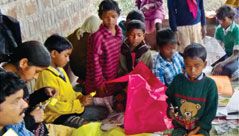 Bangalore, Sep 3: Several initiatives by the government notwithstanding, as many as 3,218 children have remained untraced in Karnataka between 2009-2012, according to official figures.
Bangalore, Sep 3: Several initiatives by the government notwithstanding, as many as 3,218 children have remained untraced in Karnataka between 2009-2012, according to official figures.
Senior police officers, while pointing out that the official figures of ‘missing cases’ seldom project the reality, say that for every 100 cases that get reported, there are many that go unreported.
“The number we have on hand is based on the complaints lodged. And, we have been able to trace many children,” one of them said.
According to statistics with the State Crime Records Bureau (SCRB), a total of 13,769 children had gone missing from January 2009 to December 2012, of which they have successfully traced 10,551 of them. Of these, 6,073 children were boys while the remaining 7,696 were girls.
While 2010 saw the highest number of missing cases being registered in the State at 4,845, there were 3,996, 3,838 and 1,090 children missing in 2009, 2011 and 2012, respectively.
During the same time (2009-2012), the number of missing children in Tamil Nadu stood at 10,429, of whom, 2,856 have remained untraced.
In Andhra Pradesh and Kerala, the same stood at: 17,102 and 5,225, and, 4,484 and 1,034, respectively.
Officials said that there are several mechanisms being put in place in the state to bring down the number of such incidents.
“The Centre, in January 2012 has issued a detailed advisory on missing children, which also deals with the steps to be taken for tracing them.
The directive throws light on how to use technology (computerisation of records) which is to be sent to the Ministry of Women and Child Development, enhance involvement of NGOs and other organisations, have community awareness programmes, et al,”an officer said.
SC?order
He also pointed out that the Supreme Court has, in June this year, directed all states and union territories to file an FIR in each of such cases and not treat them lightly.
Another officer said that in majority of the cases involving girls, they are abducted while such incidents are fewer when it comes to boys.
“While many girls also run away from home, in most cases they are kidnapped in an attempt to push them into bonded domestic labour or into flesh trade. Many boys, however, are traced in neighbouring towns or cities working in places after having run away from home,” he said.





Comments
Add new comment